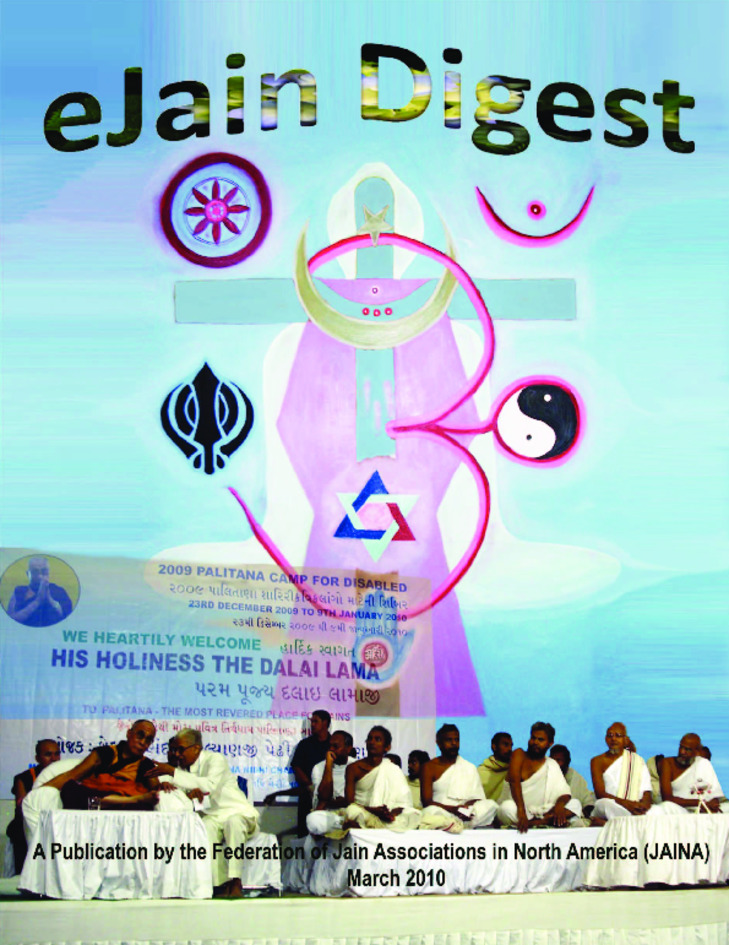
Parliament Of The World's Religions
Melbourne 2009
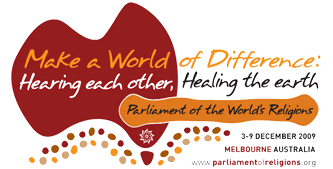
5th Parliament Of The World's Religions - Melbourne 2009
December 3-9, 2009
This report by the eJain Digest Editorial Team has been prepared based on a detailed report by Mr. Kirit C. Daftary, past President of JAINA, and valuable inputs received from Naresh Jain, JAINA’s Interfaith Committee member.
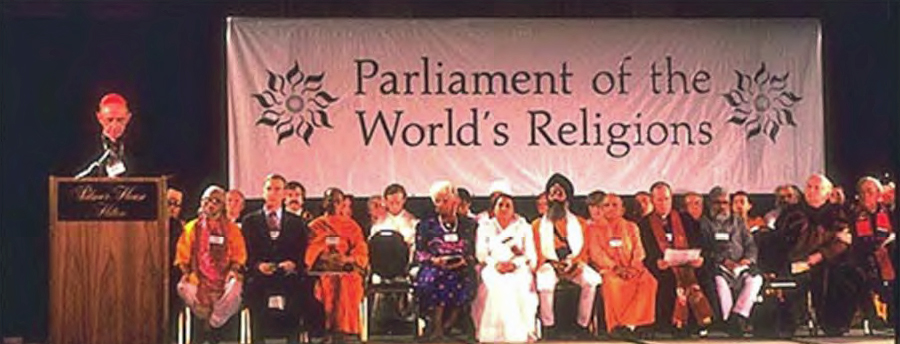
“In 1893, the Chicago Parliament of World Religions was convened to gather the world’s faiths together for the first time. The organizers had a subversive message they kept hidden from invited speakers from non-Christian traditions: Christianity is the one true faith. They assumed that if all the faiths had a chance to speak publicly to the world, it would be obvious that Christianity was superior. But things didn’t go as planned. As it turned out, the representative of Hindu, Swami Vivekananda from India, stole the show, convincing everyone that Hinduism was as valid a way to worship and experience the divine as any other. The state of the world’s religions was changed forever and the interfaith era had its symbolic beginning.”
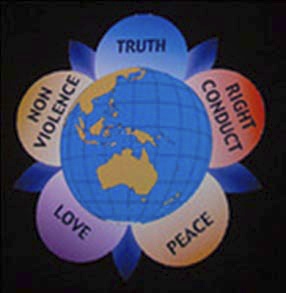 The above is an excerpt from an article covering the 2009 Parliament of World Religions, by Paul Knitter and Matthew Weiner, guest contributors to Reuters. 100 years after the 1893 event, i.e., in 1993, Council for a Parliament of the World’s Religions as an organization was revived, and has since been sponsoring a gathering of the world’s largest interreligious Parliament, convened every 5 years, in a major international city (Chicago 1993, Cape Town 1999, Barcelona 2004). The 2009 Parliament Of World Religions was held in Melbourne - Australia, where more than 6000 people from more than 200 countries gathered to discuss peace, diversity and sustainability in the context of interreligious understanding and cooperation. The major goal was to mobilize public opinion about the value of religious traditions and the critical importance of religions communicating with one another.
The above is an excerpt from an article covering the 2009 Parliament of World Religions, by Paul Knitter and Matthew Weiner, guest contributors to Reuters. 100 years after the 1893 event, i.e., in 1993, Council for a Parliament of the World’s Religions as an organization was revived, and has since been sponsoring a gathering of the world’s largest interreligious Parliament, convened every 5 years, in a major international city (Chicago 1993, Cape Town 1999, Barcelona 2004). The 2009 Parliament Of World Religions was held in Melbourne - Australia, where more than 6000 people from more than 200 countries gathered to discuss peace, diversity and sustainability in the context of interreligious understanding and cooperation. The major goal was to mobilize public opinion about the value of religious traditions and the critical importance of religions communicating with one another.
The opening of the meeting was blessed by Zoroastrians, Jains, Hindus, Muslims, Sikhs, Buddhists, Jews, Christians, Bahais, Aborigines, Shintos and many other faiths. More than 200 religions from 80 countries worldwide were represented at the Parliament, ‘The Age’ reported.
Jain presence was very notable at the 2009 Parliament of the World’s Religions held in Melbourne, Australia, December 3-9, 2009. All 6,000 attendees from around the world were exposed to the Jain teaching of Nonviolence through a variety of programs ranging from art exhibitions, dances, music, recitals, Jain lectures, interfaith panels, engagement sessions, workshops, display of rituals, and a communities night. Jain items were included in several prestigious programs and receptions and were also covered by the press. Mr. Kirit C. Daftary, past President of JAINA and Mr. Naresh Jain member of JAINA’s Interfaith Committee were among the 50 Jain members who attended this Parliament. Mr. Jain was the chairperson for the world wide Public Relations, and a chairman of the Financial Administration during this 5th Parliament of World Religions. At present he is on the board of the Parliament of World Religions.
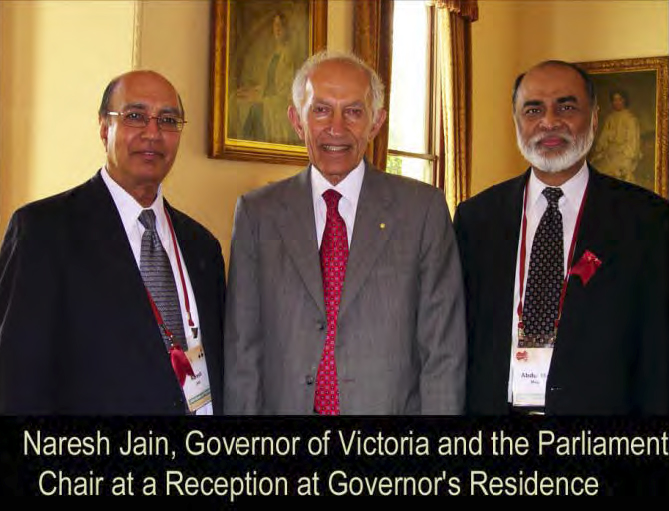
V. R. Gandhi represented Jainism in 1893, along with Swami Vivekanand. You can read about his contribution at that Parliament elsewhere in this issue. The participation by Jains at the Melbourne gathering covered many areas: from arts to philosophy and everything in between. The following is a list of various activities from the Jains. If we inadvertently missed listing any of the activities, we ask for your forgiveness - Michchhami Dukkadam.
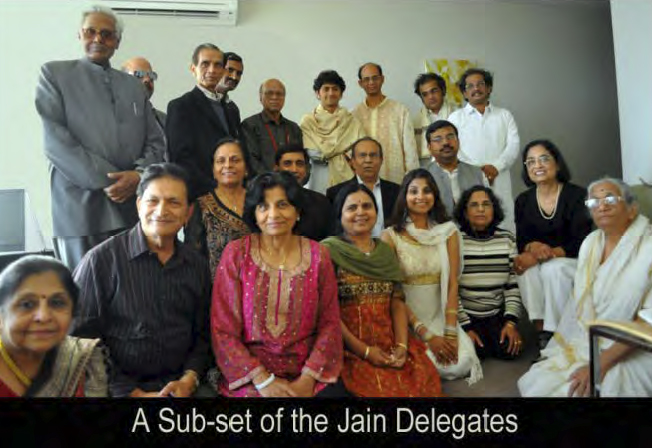
- At the inaugural function Mr. Naresh Jain gave Jain Blessings and Ms. Divya Jain Performed an Indian Classical Dance. She gave a performance on the concept of Ahimsa and at the closing ceremony she performed a dance on Jain Traditions.
- Three exhibitions highlighting Jainism were organized in this Parliament:
The Jain Art Exhibit of 38 paintings by Mahendra and Asha Mehta opened on December 4 and became a ‘must see’ event. Due to its strategic location, every delegate from religious leaders to participants visited this exhibition at least once if not more. This exhibition was supported by free distribution of a booklet “Art of Enlightenment’ that contained each painting as well as its description.
The other two Jain exhibition booths sponsored by Jain Vishwa Bharati from India for Jain literature and by the Digambar Jain Sangh from USA for contemporary Digamber Jain paintings on Navgraha by Shefali Ajmera, New York, were inaugurated in the Exhibition Center. A commemorative T shirt with Jain symbol in the front and symbols of major religions at the back were also introduced to the public through these booths.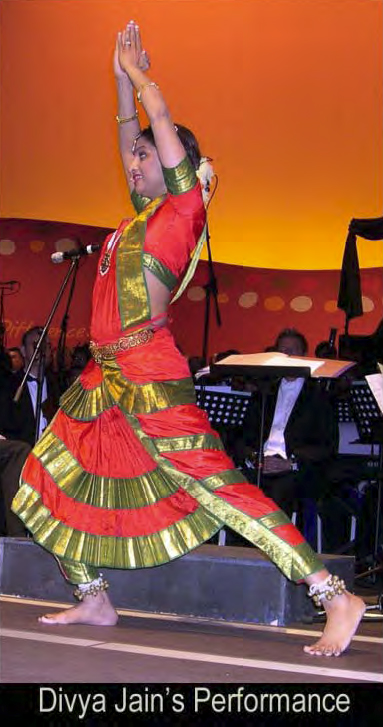
- Dr. Dipak Jain, Dean of the Kellogg School Of Management in Chicago along with Dr. Hans Küng, the renowned Swiss-German theologian, held a Panel Discussion on ‘A New Ethical Manifesto for the Global Economy’. More information on the discussion can be found on; http://www.theage.com.au/national/creed-v-greed-an-ethical-charter-20091207-kfcu.html.
Dr. Jain also spoke in a separate session on ‘Jain principles for Corporate and Social Responsibility’, with about 1500 delegates attending this session. Dr. Jain, said, “Business schools were partly to blame for promoting greed. Our students today are more focused on earning rather than learning”. Dr Jain, in his speech, reiterated that capitalism could not give up its emphasis on profits, but it needed social and environmental health too. He also was on the panel discussing ‘Religion’s imperative to Present ‘the other’ Faithfull’. - Mr. Naresh Jain and Mr. David Rosen, the chief Rabbai from Ireland conducted a panel discussion on the topic of ‘Vegetarianism - ethics, environmental concerns, and complex realities’.
- A Panel Discussion in ‘Jain Heritage and Education for Peace and Harmony’ was conducted by Amarender Muniji and Samani Mangal Pragya Ji, along with Priyadarshana Rakhecha covering the ancient eco-socio-spiritual philosophy of Jainism.
- Three panels representing Jainism were put on display. One sponsored by Guru Nanak Nishkaam Sevak Samaj Jatha from England focused on the sacred Jain site of Sametshikharji and on the Teaching of Jain Traditions depicting how Jains provided food and water for all people. The two panels one meter wide and three meters tall on ‘Emissary of the East’ based on the VR Gandhi commemorative stamp sponsored by JAINA were strategically placed on ground floor hall and on the second floor exhibit area. The panels were jointly designed by the Parliament staff and Naresh Jain extracting the descriptive material from the Parliament Archives of 1893. The panels generated lot of curiosity among visitors. Kirit Daftary made official presentation of the commemorative stamp to several Parliament officials including former Chairman Bill Lesher, Chairman Abdul Malik Mujahid; and Executive Director Dirk Ficca in the presence of Jain delegates.
- Dr. Narayan Kachhara from Udaipur gave a scholarly presentation on ‘Basic Tenets and Karma in Jainism’ and explained how the lessons learnt from this doctrine can be used to improve our day-to-day life. He also gave a response on Nuclear Nonproliferation based on teachings of Jainism, stating that Jainism, the religion of non-violence supports a nuclear free world.
- Mr. Kirit Daftary participated in a panel on Ahimsa Doctrine and Ecology.
- The Melbourne Jain Sangh invited all Jains and other parliament participants to a Communities Night. It included meetings and greetings by global Jains at dinner and a panel discussion on ‘Practicing Jainism in the Western World’ by visiting Jain scholars moderated by Naresh Jain. Other panelist included, Vinod Kapashi, Pravinbhai Shah, Narayan Kachhara, Amerandra Muni, Samaniji, Bhattrakji, and Shri Vasanth Guru.
The young Melbourne Jain Sangh with only 200 members, and many of them students, deserve a lot of credit for their hospitality and generosity. In addition, the Sangh contributed $1500 towards the Palitana Camp.
- Music and singing of Jain Stavans was performed by Kumar Chaterjee.
- Jain rituals were demonstrated by Kirit Daftary. He was joined by Nitin Doshi, Pramila Daftary and Kummar Chatterjee
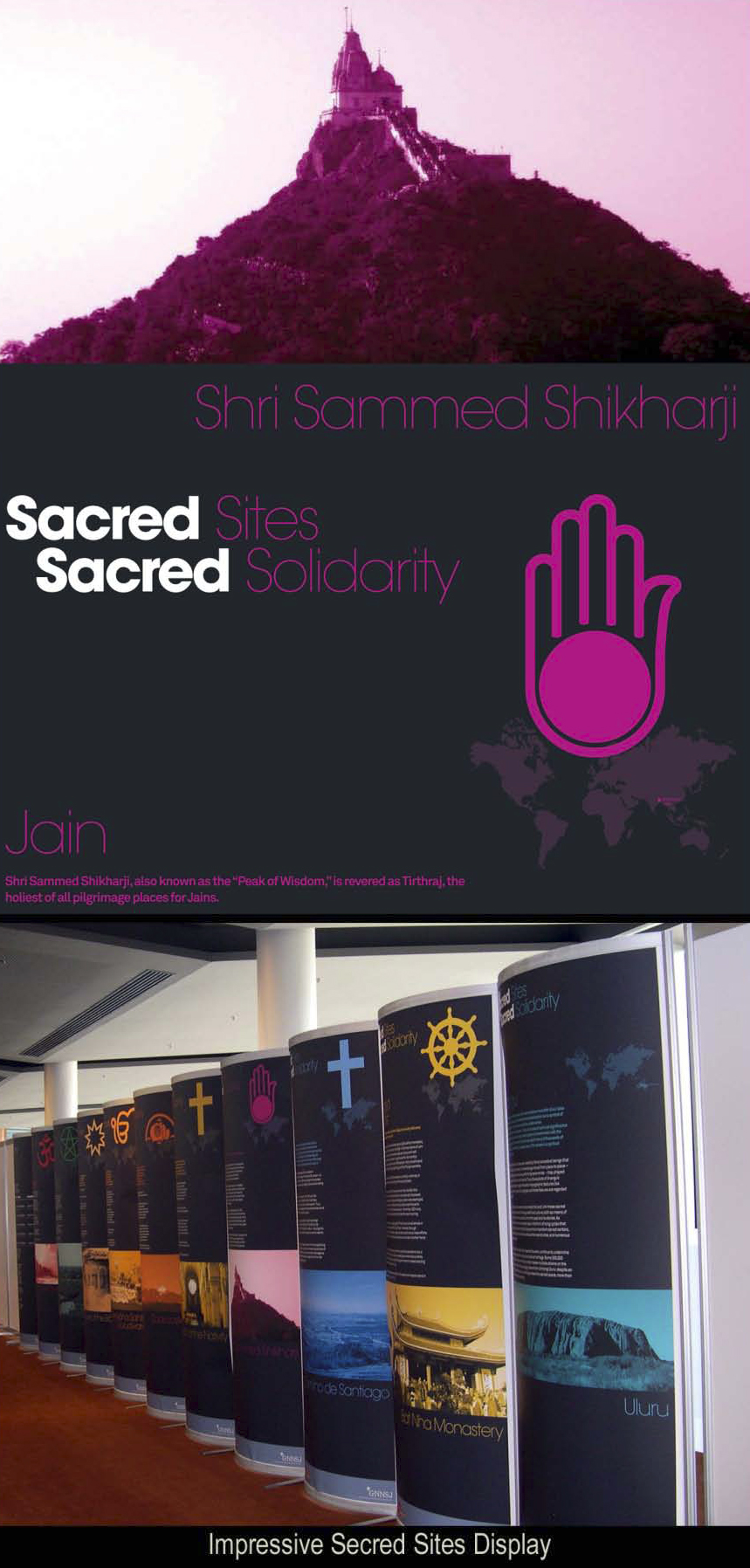 .
. - The highlight of the December 5 International Night was the Paul Carus Award given once every five years to an individual or an organization for outstanding contributions to the interreligious movement by the Council for the Parliament of the World Religions. This year’s recipient was an organization Interfaith Action for Peace in Africa (IFAPA). Naresh Jain of JAINA Interfaith Committee was among the nominees for Paul Carus Award.
- Yoga was demonstrated by Samaniji and Amarendra Muniji
- A training session on Preksha Meditation was provided by Samani Vinay Pragya and Samani Akshay Pragya
- Dr. Sohan Lal Gandhi, International President of Anuvibha made two presentations on:
- Jainism and Environment:
- The Role of Religion in Mediating Conflict: Anekantvad - The JAINA way of Mediation and Reconciliation.
- Dr. Samani Mangal Pragya, Vice Chancellor of Jain Vishwa Bharti University, gave a talk on Bhagwan Mahavir and his teachings, and its relevance to modern times.
- Girish Shah, Past President of Jain Center of Northern California participated in Partner city project. San Jose was the first Partner city in the US, developing an Interreligious Community.
- Ashta Prakari puja was performed by the Melbourne Jain Sangh. They gave a power point presentation and a live demonstration. This event was highlighted in Australian Newspaper.
- Dr. Rakshaben Shah spoke on ‘The Jain Doctrine of Ahimsa and Sustainable Living’.
- Dr. Raksha Shah, a Jain Scholar and lecturer at the Mumbai University, spoke on “Oneness With The Environment”.
- Kunal Turakhia from Bombay offered a workshop on the Appreciative Inquiry. His workshop touched upon the concepts of Appreciative Inquiry and Emotional Intelligence. A mini Appreciative Inquiry Summit was held to explain the way the 4-D's of Discover, Dream, Design, Destiny work together.
- Sanchay Jain from Jaipur presented a real life model for education based on the Balodaya program at the Children Palace in Rajsamund, Rajasthan.
The manifesto of World Parliament drew on the universal principles of respect for life, justice, solidarity, honesty and tolerance. As you can see, Jainism was very well represented in this World Parliament of Religions - with delegates from India, North America, UK and of course Australia. They exemplified the principle of common good having priority over individual interests. Jains all over the world would appreciate their efforts in this admirable endeavor. We encourage you to visit the parliament web-site www.parliamentofreligions.org.
